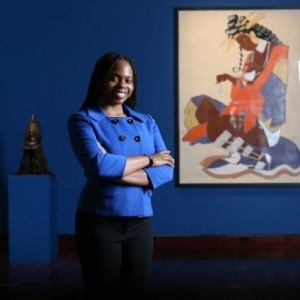Makeba Dixon-Hill’s mother told her that she was going to museums prior to being born. Dixon-Hill remembers going to a museum for the first time when she was in kindergarten. Her mom worked from home and once a month, beginning in kindergarten, they would go to the High Museum of Art to visit and have lunch on the lawn. Dixon-Hill says, “It was an amazing experience! I was spending time with one of my favorite people surrounded by art that told stories and transported me to different places.”
Dixon-Hill has always had an interest in museums and visual culture. Growing up she had many internships and volunteer experiences, including at the Hammonds House Museum, the Museum of Contemporary Art of Georgia, Clark Atlanta University Art Gallery, and the Atlanta History Center. She has evaluated programs for state arts agencies, health and wellness institutions, and nonprofit organizations for many of these. Even when her work was not museum-centered, she says, “Wherever I’ve been freelance writing, at vegan catering companies, and even The Weather Channel–the museums have been integrated into the experience.”
Today, with over 10 years of experience working with artists, organizations, and students across the country to produce engaging cultural experiences, Dixon-Hill is the Curator of Education at Spelman College Museum of Fine Art. She serves as a guest lecturer at several academic institutions and provides expertise on contemporary programming practices. She has also written successful grants for museums and individuals. In her current position, she implements ways for the Museum‚Äôs diverse stakeholders, which include students, faculty, staff, alumnae, the Atlanta University Center communities, artists, community groups, and general audiences, to engage the institution’s featured exhibitions and permanent collection.
Dixon-Hill is the Museum’s first employee dedicated to programming and public engagement. She says, “It affords me a lot of room and autonomy to build new and deeper relationships with artists, students, faculty, alumnae, and other valued members of the communities we serve and collaborate with.” Since being on-boarded, she has increased the number of programs the Museum offers and has developed partnerships.
With Spelman’s¬†museum¬†being the only¬†museum¬†in the nation emphasizing art by and about women of the African Diaspora, Dixon-Hill says to the world, ‚ÄúSpelman College museum of Fine Art provides a platform to present stories that are not often told through the lens of voices, bodies, and perspectives that are often not heard, seen, appreciated, or understood.‚Äù Dixon-Hill develops both formal and informal learning programs, in which she helps create customized tour experiences that, include art-making workshops with students and faculty docents.
Some of Dixon’s favorite educational initiatives that she has developed, which has broadened the museum are: Through Her Lens: A series of programs that partner with women and girls to explore topics of creativity, teamwork, self care, and self-esteem; Yoga in the Museum: A weekly free all levels yoga class led by certified yogis of color in the Museum; Creative Class: A candid conversation featuring a successful cultural producer that attended a school in the Atlanta University Center with a complimentary opportunity to shadow them on the job for a day; and BLACK BOX: A presentation of in-progress works that focuses on the art and culture of the African Diaspora.
For girls who are interesting in working in a museum, Dixon-Hill says, “Go for it!” If you’re interested in knowing more, she says to feel free to email her.
-Danyelle R. Carter
Student and Activist
Spelman College


It was truly a pleasure to sit with Danyelle for this feature. Thank you, Danyelle, for your consistent support of the Museum and introducing us to the Girl Museum!
Makeba is a fantastic face for the museum. Makeba is a people person and very well educated to perform her duties.
A wonderful article.
Continued success!